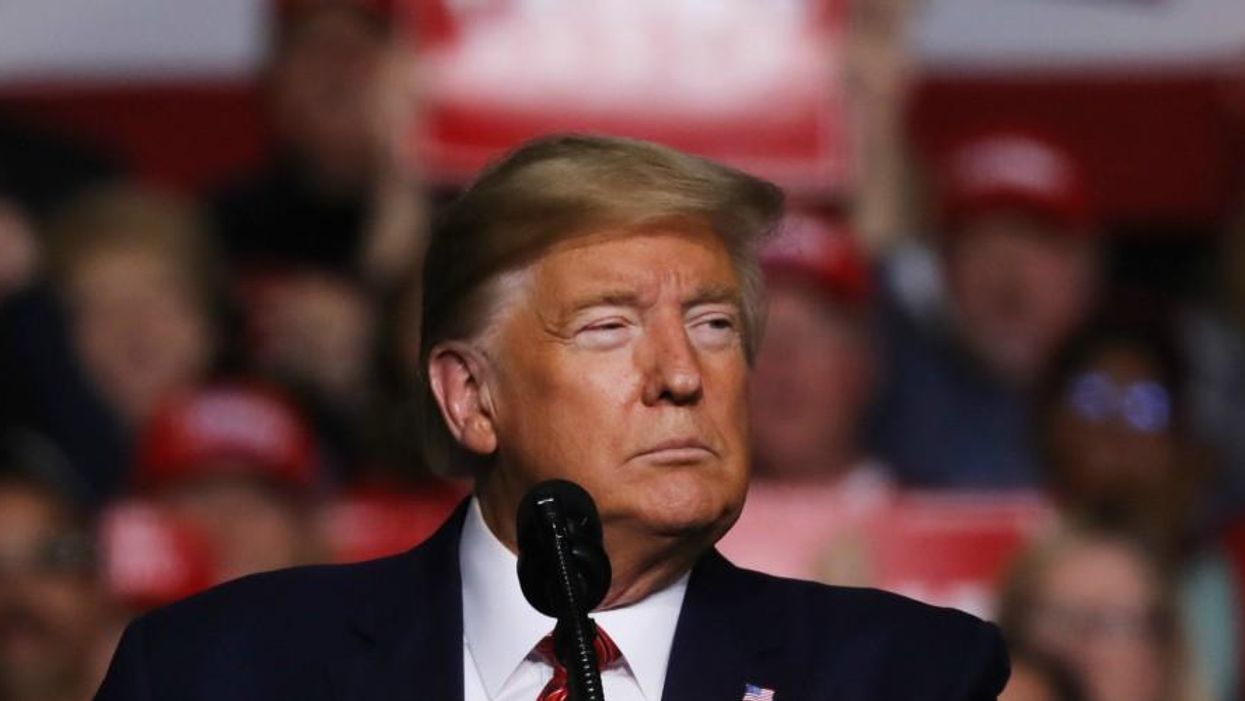BAE Systems described the incident as "deeply disturbing," and Boeing denounced the "violence, lawlessness, and destruction" that transpired.
"We will continue to carefully evaluate future contributions to ensure that we support those who not only support our company, but also uphold our country's most fundamental principles," Boeing said in a January statement.
Despite their professed aversion to the right-wing attack on the halls of Congress and vows to suspend donations to anti-democratic politicians, The Hill noted, BAE Systems, Boeing, General Dynamics, Leidos, Lockheed Martin, and Northrop Grumman "have quietly resumed" political giving to Republicans who--just hours after the deadly mayhem on Jan. 6--objected to the certification of President Joe Biden's Electoral College victory.
In May, weapons manufacturers even increased their spending on the GOP lawmakers who abetted the insurrection, the news outlet reported. Raytheon is alone among top U.S. military contractors in maintaining its pause on PAC donations.
According to The Hill's analysis of the latest Federal Election Commission (FEC) filings, arms dealers last month contributed to more than one-third of the 147 Republicans who endorsed Trump's anti-democratic revolt.
"The companies' reversal is another example of how our system for awarding money to contractors is often pay-to-play," Mandy Smithberger, director of the Center for Defense Information at the Project on Government Oversight, told the news outlet. "The size of agency budgets and programs should be based on performance, but too often it's clear that even these companies see it's based on access and corruption."
The timing of the military industry's change of heart was notable. "Defense firms resumed giving through their political action committees as Congress began work on the annual National Defense Authorization Act, which is expected to go through initial markups before the August recess," The Hill reported.
Biden has requested a $753 billion military budget for 2022, a slight increase over the current amount of funding Congress approved last year during the Trump administration. Weapons manufacturers, meanwhile, are heavily dependent on massive levels of government spending, which generates a substantial portion of their revenue.
According to Sludge's David Moore, BAE Systems, Lockheed Martin, and Northrop Grumman each "received more than 85% of their 2019 revenue from government contracts." Moreover, he wrote, "some 50-60% of the Pentagon's budget goes to the weapons contractors who often make maximum PAC contributions to the campaigns of congresspeople who approve funding for and oversee their contracts."
Lockheed Martin--the nation's biggest military contractor and recipient of nearly $76 billion in government contracts in 2020--last month contributed to "political action committees affiliated with 25 of the congressional Republicans who objected to the Electoral College vote after bankrolling only a few of them in April," The Hill reported. The company said in a statement Wednesday that it would "continue to observe long-standing principles of non-partisan political engagement in support of our business interests," the news outlet added.
Boeing, which declined to comment on its change in policy, "resumed its donations last month as well, shelling out around $900,000 to political action committees," the news outlet noted. "The company donated to several of the 147 Republicans, giving $5,000 each to House Minority Leader Kevin McCarthy (R-Calif.) and House Minority Whip Steve Scalise (R-La.)."
Five thousand dollars is the maximum amount that corporate PACs, which are funded by executives and employees, are allowed to donate per election cycle to lawmakers' campaign accounts and leadership PACs. "While that's a relatively small figure in pricey modern-day elections," The Hill pointed out, "company executives and lobbyists have credited PAC donations for helping them get their message across to lawmakers."
Other arms dealers "made their first donations to election objectors in April then increased their contributions the following month," according to the news outlet. While Leidos said in a statement that its renewal of PAC donations in the second quarter of 2021 was accompanied by the introduction of new criteria that considers recipients' "integrity" and "character," BAE Systems, General Dynamics, and Northrop Grumman declined to comment on their decisions to resume handing out tens of thousands of dollars to Republican lawmakers, including ones who supported Trump's coup attempt.
The Hill detailed which of the GOP's insurrectionist lawmakers have benefitted the most from weapons manufacturers' revival of PAC donations:
Rep. Ken Calvert (R-Calif.) is the biggest recipient of defense PAC donations among lawmakers who voted against certifying President Biden's victory over former President Trump. Calvert is the top Republican on the powerful House Appropriations Defense Subcommittee, which determines funding levels for defense contractors. His campaign account and leadership PAC took in a combined $31,000, according to FEC filings.
Rep. Vicky Hartzler (R-Mo.), the top Republican on the House Armed Services Tactical Air and Land Forces Subcommittee, was the No. 2 recipient of PAC money, with $22,500. Her subcommittee manages contracts for pricey fighter jets that compete for funding, such as Lockheed Martin's F-35 and Boeing's F-15EX.
Rep. Mike Rogers (R-Ala.), the top Republican on the House Armed Services Committee, and Rep. Mario Diaz-Balart (R-Fla.), a member of the House Appropriations Defense Subcommittee, also received significantly more than other lawmakers who voted to overturn the election.
According to OpenSecrets.org, the military industry's 52 PACs gave approximately $14.4 million to candidates in the 2020 cycle, with about $7.8 million going to Republicans and $6.6 million going to Democrats. Those donations, The Hill noted, "outpaced other influential industries, including pharmaceutical manufacturers, oil and gas companies, commercial banks, and law firms."




